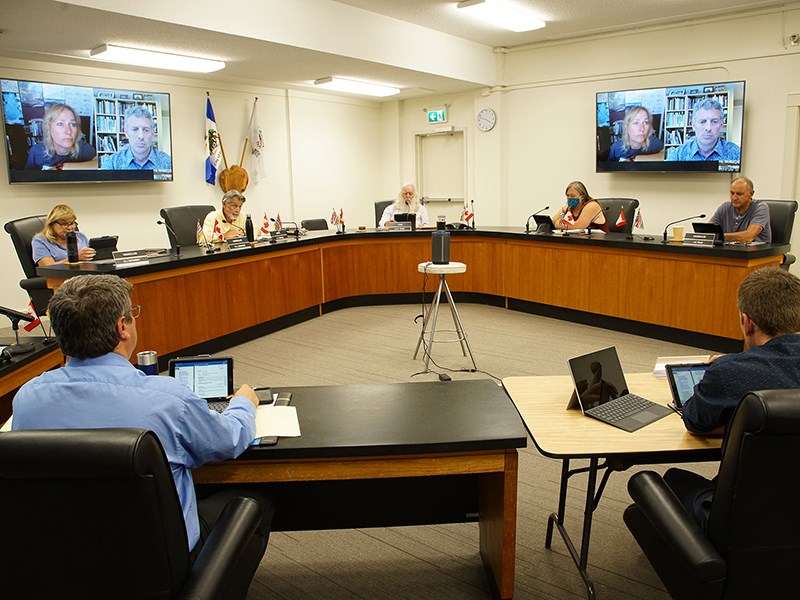City of Powell River Council is looking into adjusting sewer rates.
At the August 27 finance committee meeting, chief financial officer (CFO) Adam Langenmaier provided a review with proposed updates to the city’s sewer rates. He said they are contained in three different bylaws.
The last time the sewer rates were changed was 2019, according to Langenmaier. He said in the 2020 budgeting process, he gave a recommendation for a zero per cent change due to the changes going through for property taxes.
Langenmaier said for the method the city has used to determine sewer rates, he has looked to the long term. He said there are some big items coming, such as the liquid waste treatment plant. He said he used a computer modelling program called Waterworth, which provides an interesting and visual method to see how rates are arrived at.
“All of the numbers presented in front of you have lots of rationale and reasoning,” Langenmaier told the finance committee. “At the end of the day, when we come down to the financial impact, it’s really what hits our community, and so my recommendations are a 7.5 per cent increase for 2021 and 2022, and then dropping down to five per cent for 2023 and 2024.
“The rationale for a four-year rate structure is to get us heading in the direction that we know, at the end of that four years, we will likely have a new wastewater treatment plant and we’ll have some new data coming out of what it’s costing to operate, the expected lifespan, and any other changes in our sewer system that are significant.”
Langenmaier said the changes in percentages seem large, but the base sewer rates are relatively low. He said to bring up $30 a year in sewer revenue per house equates to that 7.5 per cent change. He added that changes today really impact the city’s ability to continue to maintain a sewer system in good operations and to save for future projects and items the city knows will need to be replaced.
“We know for a fact that pipes don’t last forever,” said Langenmaier. “We know into the future it is going to cost more money to replace them. Making smaller changes, early, will save people in the future from bigger changes.”
In his report to the finance committee, Langenmaier stated the average single-family dwelling sewer utility charge in 2020 was $470.40. If council was to adopt his recommendations, the fee would be $505.38 in 2021, $543,31 in 2022, $570.32 in 2023 and $599.34 in 2024.
After receiving a presentation on the long-term financial model, finance committee chair and councillor George Doubt said what he thinks is being proposed is the creation of a plan for the future, where the city will be creating a bank account to pay for big projects to come. He said the next time a large capital expenditure is required, taxpayers of the day will not be hit with a big, sudden tax levy.
“There will be funds there ahead of time and funds there to maintain the system as it goes along,” said Doubt.
Mayor Dave Formosa said Powell River is a high-taxed community and the city is paying for a brand new system that should be good for 50 years, and then the proposed plan would be to start paying for the next system for the taxpayers’ great-grandchildren.
“I just don’t know how we can afford to pay these huge amounts,” said Formosa. “Our taxes are going to go up considerably and then we want to start saving for our great-grandchildren’s sewer. I get having a reserve and enough money to do maintenance but I don’t want to be saving to pay for the great-grandchildren’s sewer when I’m paying this huge amount of money to pay for this sewer.”
Councillor Jim Palm said he did not like seeing the 7.5 per cent increases in the first two years.
“It’s not a pretty picture,” he added.
Councillor CaroleAnn Leishman said she was grateful to see the recommendations and it is clear what needs to be done.
“I’m totally onboard with the recommendations,” said Leishman.
Langenmaier said the amounts being proposed provide for a reasonable amount of money to have in the bank to deal with capital expenses that come up. He said it could be used for piping, for emergency repairs and it could be used to pay for a portion of the next liquid waste treatment plant in 75 years.
He said one of the reasons to put the money away is so the city does not have big increases when major repairs to infrastructure, such as aged-out piping, have to be made.
“If we had $10 or $15 million in reserve, we’d be able to draw on our reserve and get that debt requirement down while maintaining a reserve for emergencies,” said Langenmaier.
Doubt said if the city has a reserve, it can pay for repairs out of the reserve. If the city does not have the reserve, the city would have to borrow money, which would cost taxpayers in the future.
“I’m in favour of doing it,” said Doubt. “It’s responsible to look at the value and plan ahead, and be the people who have decided to save money for the future expenses, rather than being the people who take the politically expedient route and say we are not going to save money, and good luck to you for what happens in the future.”
Formosa said the increase in the average home for sewer over the four years is $130. He asked what happens after 2024.
Langenmaier said he was not comfortable proposing a longer fee change than four years.
“In four years from now we’ll revisit,” said Langenmaier.
The finance committee referred the matter to the next city council meeting to consider three sewer rate bylaws to be considered for three readings.



